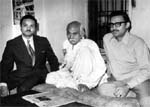Mustafa Zaman Abbasi tells New Age
 There are very few men and women to have lived on this planet and exerted the kind of influence that Nazrul has. He doesn’t really need adjectives, but yet some call him Bidrohi Kabi (the rebel poet) and yet others identify him as a kindred spirit of the oppressed.
There are very few men and women to have lived on this planet and exerted the kind of influence that Nazrul has. He doesn’t really need adjectives, but yet some call him Bidrohi Kabi (the rebel poet) and yet others identify him as a kindred spirit of the oppressed.
The versatile Mustafa Zaman Abbasi, a singer, researcher, spoke thus on the eve of national poet Kazi Nazrul Islam’s 115th birth anniversary, in an interview with New Age.
Mustafa Zaman Abbasi has in one way or the other dedicated his life to the celebration of Nazrul’s music and literature. Being a scholar, he has authored over 50 books on subjects as varied as music, philosophy, biography and novels.
Mustafa Zaman Abbasi recently published a book on the national poet titled ‘Kazi Nazrul Islam, Man and Poet’. Published last year, the book has already received wide critical acclaim from the likes of Nobel Laureate professor Muhammad Yunus, emeritus professor Anisuzzaman.
Abbasi emphasised on Nazrul as a multifaceted poet. ‘Nazrul has been able to do something that perhaps no other poet or author has been able to attain, which is, blending the differences and creating a unity in Bengali culture. Bengali culture is composed of many elements that come from different cultures from all around the world. But in my opinion, Bengali culture is composed of two main cultures or groups of people. One of them is the Hindu culture and the other comes from the Muslim or Islamic cultural practices. Nazrul is the epitome of both these cultures and both groups of people. He is perhaps the only poet, author and musician, who has been able to produce content which has a unified wholeness, his content is such that is relative to both Islamic and Hindu populations. This is a feat that I believe no one else has been able to accomplish.’
A closer look at Nazrul’s works reveals that he has not only been able to unify the two main population groups of the subcontinent but perhaps even rise beyond that. In his works, we see his fiery stance for the oppressed, against the oppressor.
Abbasi further illustrated, ‘Nazrul is one of the most versatile poets ever born. Personally, I feel he is on par with Jalaluddin Rumi when it comes to certain devotional poems. On the other hand, he is the best composer this continent has seen or will ever see.’
Abbasi also added that singing Nazrul’s songs are considerably difficult as one has to practise classical music for several years to let his or her voice develop enough for the scales and ranges of Narul’s songs. He stressed, ‘Nazrul is still much neglected, and it will take people decades more to fully comprehend the depths and richness of his works’.
As long as Bangla language lives, Nazrul would reign in the hearts of people. And as long as there is oppression, the poet’s words would ring in our minds, ‘Moha Bidrohi ronoklanto/ Ami sei din hobo shanto/ Jobe utpiriter krondon role/ Akashe batase dhonibena.’
-With New Age input




















